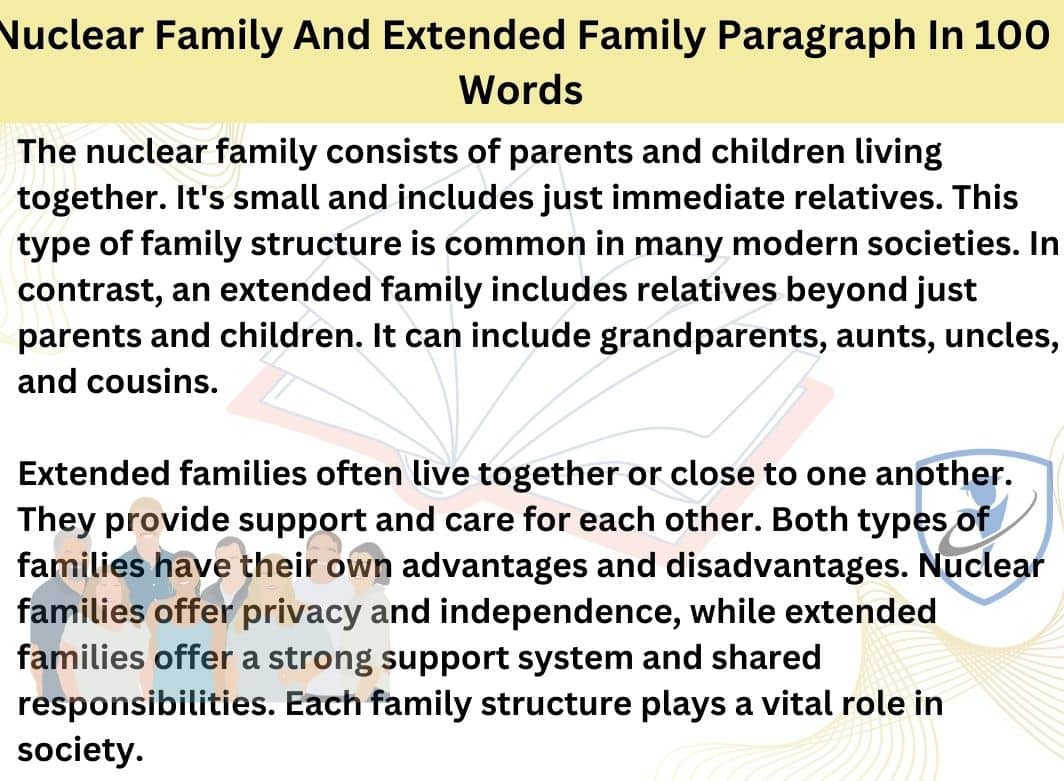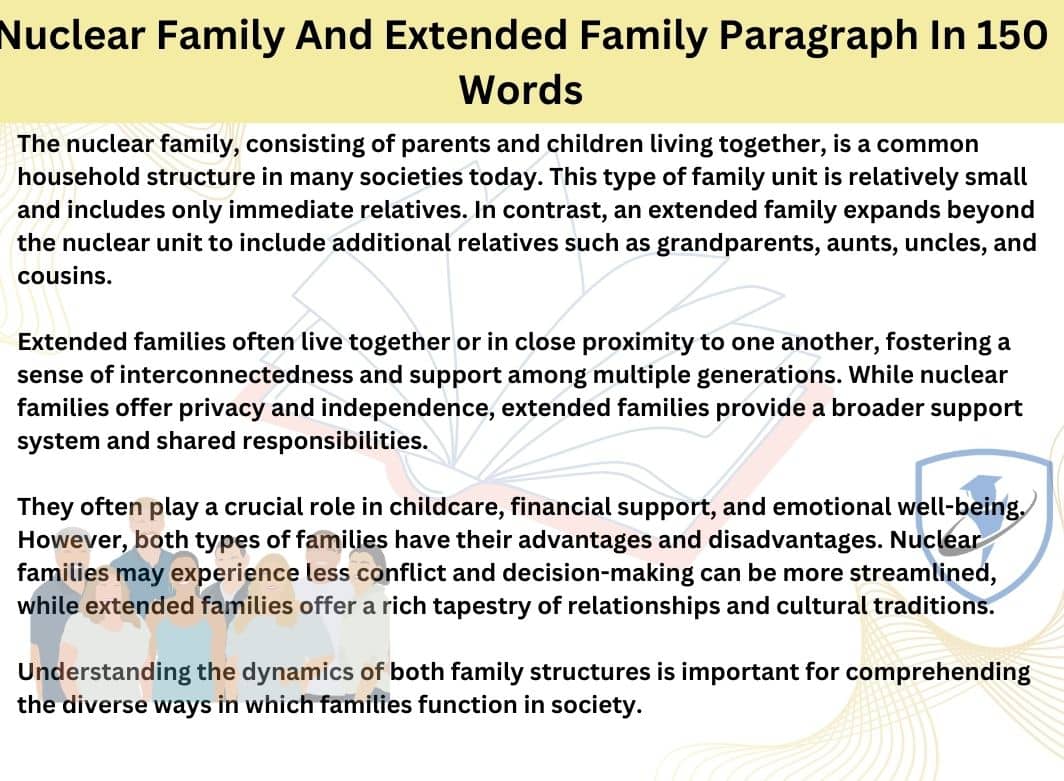Nuclear Family And Extended Family Paragraph
Nuclear Family And Extended Family Paragraph For All Class (100- 500 words)
The nuclear family, consisting of parents and children, is prevalent in many societies, offering a close-knit unit for child-rearing. In contrast, the extended family expands to include grandparents, aunts, uncles, and cousins, fostering a broader support network. Both structures play crucial roles in shaping familial dynamics and cultural norms.
Nuclear Family And Extended Family Paragraph 100 Words For 1, 2, 3 Students
The nuclear family consists of parents and children living together. It’s small and includes just immediate relatives. This type of family structure is common in many modern societies. In contrast, an extended family includes relatives beyond just parents and children. It can include grandparents, aunts, uncles, and cousins.
Extended families often live together or close to one another. They provide support and care for each other. Both types of families have their advantages and disadvantages. Nuclear families offer privacy and independence, while extended families offer a strong support system and shared responsibilities. Each family structure plays a vital role in society.

Nuclear Family And Extended Family Paragraph in 150 Words For 4 & 5 Students
The nuclear family, consisting of parents and children living together, is a common household structure in many societies today. This type of family unit is relatively small and includes only immediate relatives. In contrast, an extended family expands beyond the nuclear unit to include additional relatives such as grandparents, aunts, uncles, and cousins.
Extended families often live together or in close proximity to one another, fostering a sense of interconnectedness and support among multiple generations. While nuclear families offer privacy and independence, extended families provide a broader support system and shared responsibilities.
They often play a crucial role in childcare, financial support, and emotional well-being. However, both types of families have their advantages and disadvantages. Nuclear families may experience less conflict and decision-making can be more streamlined, while extended families offer a rich tapestry of relationships and cultural traditions.
Understanding the dynamics of both family structures is important for comprehending the diverse ways in which families function in society.

Nuclear Family And Extended Family Paragraph in 200 Words For 6, 7, and 8 Students
The nuclear family, comprising parents and their children living under one roof, is a prevalent family structure in many modern societies. It emphasizes a close-knit unit with immediate family members. Conversely, the extended family extends beyond this core unit to encompass relatives like grandparents, aunts, uncles, and cousins. This extended structure often fosters a sense of belonging and support across multiple generations.
In a nuclear family, decision-making tends to be more streamlined, with fewer people involved in household matters. Privacy and independence are commonly valued in this setup. However, in an extended family, responsibilities are shared among various members, promoting a collaborative approach to childcare, financial support, and emotional well-being.
Both family structures offer unique advantages and challenges. Nuclear families may provide more autonomy and flexibility, allowing for easier adaptation to changing circumstances. On the other hand, extended families offer a broader support network, enabling individuals to rely on a larger circle of relatives for assistance and guidance.
Each type plays a significant role in shaping individuals’ experiences and relationships, influencing everything from cultural traditions to social norms. By recognizing and appreciating the strengths of both family models, we can cultivate a deeper understanding of familial dynamics and enhance our interactions within our own families and communities.
Nuclear Family And Extended Family Paragraph in 250 Words For 8,9,10 Students
The nuclear family, composed of parents and their children, epitomizes a self-contained unit that emphasizes autonomy and privacy.The extended family expands beyond this nuclear core to include a broader network of relatives, such as grandparents, aunts, uncles, and cousins. This extended structure fosters intergenerational bonds and provides a robust support system.
Nuclear families often prioritize efficiency and direct decision-making, as fewer individuals are involved in household matters. This streamlined approach can lead to quicker resolutions but may also result in limited perspectives.
In contrast, extended families distribute responsibilities across multiple generations, encouraging collaboration and mutual support. This collaborative dynamic can enrich family life by incorporating diverse viewpoints and experiences.
Understanding the dynamics of nuclear and extended families is essential for comprehending the diversity of family structures in society.
While nuclear families offer independence and flexibility, they may lack the extensive support networks found in extended families. Extended families, on the other hand, provide a wealth of resources and emotional support but may also experience challenges related to coordination and communication among members.
Understanding the nuances of nuclear and extended family structures is crucial for navigating interpersonal relationships and societal dynamics. By recognizing the strengths and weaknesses of each model, individuals can better appreciate the complexities of family life and cultivate empathy and understanding within their own familial contexts.
Ultimately, both nuclear and extended families contribute to the rich tapestry of human experience, shaping individuals’ identities, values, and relationships in profound ways.
Nuclear Family And Extended Family Paragraph 300 Words For 9, 10, 11, 12 Students
The nuclear family, comprising parents and their children living in one household, represents a fundamental unit in modern society.
This compact structure emphasizes intimacy and autonomy, allowing for close relationships and efficient decision-making. In contrast, the extended family expands beyond the nuclear unit to include relatives like grandparents, aunts, uncles, and cousins. This expansive network fosters intergenerational bonds and provides a broader support system.
Nuclear families often prioritize privacy and independence, valuing self-sufficiency and direct decision-making. However, this autonomy may come at the expense of the diverse perspectives and support networks found in extended families.
A family can exhibit characteristics of both nuclear and extended structures. For example, a nuclear family may maintain close ties and receive support from extended relatives who live nearby or visit frequently.
Extended families distribute responsibilities among multiple generations, promoting collaboration and mutual assistance in childcare, financial matters, and emotional support. Family structures influence societal norms by shaping individuals’ values, beliefs, and behaviors. They also play a role in socialization, education, and the transmission of cultural traditions across generations.
While nuclear families offer a sense of stability and efficiency, they may lack the extensive support networks and cultural continuity found in extended families. Extended families, with their rich tapestry of relationships and traditions, provide a sense of belonging and interconnectedness across generations. However, managing the complexities of communication and coordination among multiple relatives can present its own set of challenges.
By recognizing the strengths and weaknesses of each model, individuals can develop a deeper appreciation for the diverse forms of family life and the ways in which they shape identity and belonging. Whether one belongs to a nuclear or extended family, both offer valuable lessons in cooperation, empathy, and resilience, contributing to the multifaceted tapestry of human experience.
Nuclear Family And Extended Family Paragraph in 500 Words For 9, 10, 11, and 12 Students
The nuclear family and extended family represent two distinct yet interconnected structures that play significant roles in shaping individuals’ lives and society as a whole. Understanding the dynamics, advantages, and challenges of each can provide valuable insights into familial relationships and societal norms.
The nuclear family, typically consisting of parents and their children residing together in one household, is a cornerstone of modern society. This intimate unit fosters close relationships and efficient decision-making, as fewer individuals are involved in household matters. Privacy and independence are often prized in nuclear families, allowing for personal autonomy and the development of individual identities.
In contrast, the extended family expands beyond the nuclear unit to include a broader network of relatives, such as grandparents, aunts, uncles, and cousins. This expansive structure fosters intergenerational bonds and provides a rich tapestry of relationships that contribute to a sense of belonging and support. Extended families often collaborate on various aspects of life, including childcare, financial support, and emotional well-being, distributing responsibilities across multiple generations.
Both nuclear and extended families offer unique advantages and face distinct challenges. Nuclear families are often characterized by stability and efficiency, with streamlined decision-making processes and clear lines of authority. However, they may lack the extensive support networks and cultural continuity found in extended families.
Extended families, on the other hand, provide a wealth of resources and emotional support, drawing on the collective wisdom and experience of multiple generations. Yet, managing the complexities of communication and coordination among numerous relatives can present its own set of challenges.
Furthermore, the dynamics of nuclear and extended families are influenced by cultural, economic, and social factors. In some cultures, extended families living together or in close proximity are the norm, fostering strong intergenerational ties and communal support systems. In contrast, in societies where nuclear families predominate, there may be greater emphasis on individualism and self-reliance.
Despite their differences, both family structures play vital roles in society. Nuclear families provide a sense of stability and security, serving as the primary source of emotional support and socialization for children. They also contribute to economic productivity, as parents can focus their resources and attention on their immediate family unit.
Extended families, meanwhile, offer a broader support network and cultural continuity, preserving traditions and values across generations. They provide a safety net during times of crisis and serve as repositories of familial history and knowledge.
So, the nuclear family and extended family represent two essential components of familial relationships and societal structures. Each offers unique advantages and faces distinct challenges, shaped by cultural, economic, and social factors.
Understanding the dynamics of both family structures is crucial for navigating interpersonal relationships and societal norms, contributing to a deeper appreciation of the diverse forms of family life. Ultimately, whether one belongs to a nuclear or extended family, both play integral roles in shaping individuals’ identities, values, and relationships, enriching the fabric of human experience.
Most Important Paragraph:
| Paragraph On Save Environment |
| An Ideal Teacher Paragraph. |
| My Hobby Reading Books Paragraph. |
| Paragraph On My Neighbourhood. |
| Paragraph On Winter Season. |
Frequently Asked Questions Nuclear Family And Extended Family Paragraph
Q: What are the advantages of a nuclear family?
Nuclear families often prioritize privacy, independence, and efficient decision-making. They offer stability, intimacy, and autonomy for individual family members.
Q: What are the advantages of an extended family?
Extended families provide a rich tapestry of relationships and support networks. They offer emotional support, shared responsibilities, and cultural continuity across multiple generations.
Q: What are the challenges of a nuclear family?
Nuclear families may lack the extensive support networks and cultural continuity found in extended families. Decision-making can sometimes be limited, and there may be pressure to fulfill multiple roles within a smaller unit.
Q: What are the challenges of an extended family?
Managing communication and coordination among multiple relatives can be challenging in extended families. Conflicts may arise, and decision-making processes can be more complex due to the involvement of numerous family members.
